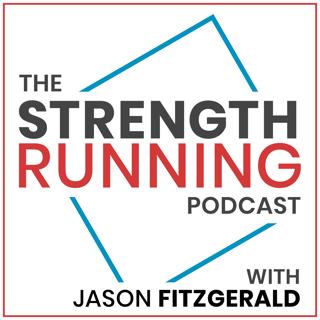
Episode 56: How to Balance Running in Your Life, with Keira D'Amato
In reality, we have to make time and shuffle our schedules to accommodate all of our responsibilities: Kids and family Work and professional obligations Social events Sleep? Maybe? It's no easy feat to train well, work, have a family, and find some free time to read or have fun. I remember back to one of the most challenging times of my life: the year after college when I had a 75-minute commute and a 9-hour work day. That meant I was running 80-85 miles per week at 5:30am in the dark, in the freezing winter of Massachusetts. I had no time to do anything besides work, run, and ensure I slept 8 hours a night. Now that I have a family, that's not a possibility. Hard decisions have to be made... To help with those tough decisions, I want to introduce you to Keira D'Amato. She was a 4-time All-American at American University in Washington, DC, specializing in events ranging from the 5k to cross country. After college, she worked for years as the marketing director for Potomac River Running and today she's the "running realtor" for the northern Virginia and DC areas. But she never quit running. Just last month, she won the Rock n Roll Half Marathon in Washington, DC. Keira is running after the Olympic Trials marathon standard of 2:45 - and she's close with her 2:47 PR! Oh, and she's married with two kids... In this conversation, we discuss: the many roles she's had in the running industry what she's learned about runners from being so involved in the sport her marathon progression from nearly 4 hours to 2:47 (!!) how her current training has gone and her strategy to get the OTQ how she manages to train at an elite level with a job and a family
17 Apr 201847min

Episode 55: How Tyler Andrews is Chasing the 50K World Record
Tyler Andrews was a competitive Division III runner - but certainly not a multiple All-American or other kind of standout performer. But that never stopped him from chasing big goals. After graduating from Tufts University, Tyler kept training and improving. He's since qualified for the Olympic Marathon Trials and currently holds the world record for the fastest half marathon ever run on a treadmill (63:38). Now he has his sights set on another world record: the 50K ultramarathon distance. And this Friday, he'll be making that WR attempt in California at the Santa Barbara Easter Relays. After 125 laps on the track, we'll know if he was ready to topple the 30-year record of 2:43:38. In this far-ranging conversation, Tyler and I discuss a host of issues: The geeky nitty gritty of his training - most at 9,000+ feet altitude in Quito, Ecuador His pacing and fueling approach for a track 50k More philosophically, why is he attempting to break this record? And a lot more...
9 Apr 201853min

Episode 54: Listen in on a Coaching Call About Running a Sub-3 Marathon
It’s no easy feat to run a marathon under three hours. It’s faster than the fastest Boston Qualifying time of 3:05 (for young men) and according to one analysis, only 4% of men and just 1% of women achieve this level of performance. An article from LiveStrong notes that: “the nonprofit organization RunTri used the times of 230,251 finishers in 25 races to determine that in the 2011-2012 marathon season the average time for any person, regardless of gender or age, was 4 hours, 24 minutes and 0 seconds.” I’m not familiar with either of these sources so we should be careful with the results. Let’s take them with a big grain of salt. But still, they underscore the general idea that a sub-3 marathon is really hard! And especially for women, who weren’t born with many of the biological “tools” that aid performance (higher muscle mass, more testosterone, etc.). So this coaching call was particularly exciting for me. Lindsey has a 3:14 personal best but that wasn’t under ideal conditions – in other words, she knows a lot of improvement is possible. In this conversation, we discuss her training background, past race performances, and the training upgrades required to make her sub-3 marathon dream a reality.
28 Mars 201850min

Episode 53: How to Run a Fast Mile, with NCAA Mile Champion Henry Wynne
Henry Wynne has an unusual origin story: he’s a former lacrosse player who had no interest in running but his parents encouraged him to stick with the sport in high school. Fast forward about 10 years later and today, he’s an elite middle-distance athlete sponsored by Brooks. A former runner for the University of Virginia, he's had several notable accomplishments over the years: 2016 Indoor NCAA Mile - Champion 2016 Outdoor NCAA Mile - 3rd 4 x All-American School Record Holder, 1500m His personal best in the mile is 3:55 (from less than two weeks ago!) - and he's going to let you in on how he prepares to race. Resources helpful for milers and other middle-distance runners: Increase muscle tension to race faster How to lift for explosivity Train your top end running speed How to run hill sprints Lift for speed and power
5 Mars 201848min

Episode 52: Maggie Callahan on The Benefits of Strength Training
I had the pleasure of getting to know Maggie last fall when she modeled the exercises for our new strength training program. We spent a few hours at a weight lifting gym called Barbell Strategy in Boulder, CO. Maggie and Addie Bracy (2x Mountain Runner of the Year) demonstrated 40+ exercises and we had a videographer to capture all of the magic. During her time at the University of Arizona, she won the PAC-10 Steeplechase Championship (she'll also tell you that she's twice won her beer in weight!). Her PR for the steeple - one of my absolute favorites - is 10:03 or the equivalent of about 10:45-10:50 for 2-miles (with 30-inch barriers and water jumps). It’s quite impressive. Now, Maggie trains under elite coach Brad Hudson. Brad, as I’m sure you know at this point, is the author of my favorite book on running - Run Faster: How to be Your Own Best Coach From the 5k to the Marathon. If you don’t own this book, go buy it. You won’t regret it. Back to Maggie: just last month she got on the podium at the Arizona RnR Hlaf Marathon, running 1:17:20 for third place. And I'm thrilled she's on the podcast to talk about her running and the benefits of strength training she has personally experienced.
26 Feb 201838min

Episode 51: Dimity McDowell: The Cofounder of Another Mother Runner
Dimity is the cofounder of Another Mother Runner - one of the largest communities you'll find for women runners. Besides the blog, the AMR ecosystem includes a helluva lot: The Another Mother Runner podcast AMR retreats Run Like a Mother Train Like a Mother Tales From Yet Another Mother Runner The AMR store I'm publishing this episode as an excerpt from Team Strength Running (if you're not sure what that is, sign up here and I'll give you all the details next week). Dimity is on the Strength Running podcast today to talk about the many issues that are more unique to women. As you can imagine, I'm not the best person to address this topic. As a man, there are a lot of things I'm simply not aware of or privy to in the sport of running. It's not just women's issues; I bring in outside experts on everything that's outside of my wheelhouse: Running through pregnancy Sports psychology and "mental training" The physiology of lifting weights And I'm thrilled to introduce you to Another Mother Runner and the great work they're doing for the running community.
15 Feb 201840min

Episode 50: Running 101: How I think about training runners to race faster
Two years ago, I was interviewed for an event called The Running Summit. I spoke about wide-ranging topics: How I started running My injury prevention philosophy The biggest areas of improvement for runners Strength training do's and don'ts Warm-ups and cross-training My favorite aspects of coaching How running "scales" My favorite running authors The two principles of sound form you must remember Who benefits from getting a coach? How to build your mileage more safely than the 10% rule Why 'Run Less, Run Faster' fails as a training methodology and a lot more! As you can see, we went DEEP on running and touched on nearly every important element of sound training. This is an audio recording of our interview where you'll be able to glean insights from my experience as a runner, coach, and a coached athlete.
6 Feb 201857min

Episode 49: Pro Triathlete Jesse Thomas on Fueling for Ironman Triathlons
You might recognize Jesse as the dude who races in Aviators (there's never an inappropriate time for Aviators). He was an All-American and school record holder at track and field powerhouse Stanford University. After graduating with a Masters in Mechanical Engineering, Jesse started a company and got an MBA before going pro in triathlon in 2011. You might say that Jesse likes to stay busy. Today, he's the CEO of Picky Bars - a company he cofounded with his wife Lauren Fleshman - and an elite triathlete who's a 2x Ironman Champion. After reading a fascinating article in Triathlete Magazine last year, I reached out to Jesse to learn more about his nutrition philosophy and approach to fueling for such a grueling sport. As the CEO and cofounder of a company that helps athletes fuel their workouts, a pro triathlete, and a highly educated guy, Jesse has interesting perspectives about the nuances of eating 6,00 calories per day. Does he follow any type of formal "diet?" How does his nutrition change throughout the season and year? Is he a calorie counter, scorer, or macronutrient calculator? How "perfect" does he try to be with his nutrition? Jesse joined me on the Strength Running podcast to talk about these issues and a lot more. I hope you'll listen.
31 Jan 201857min




















